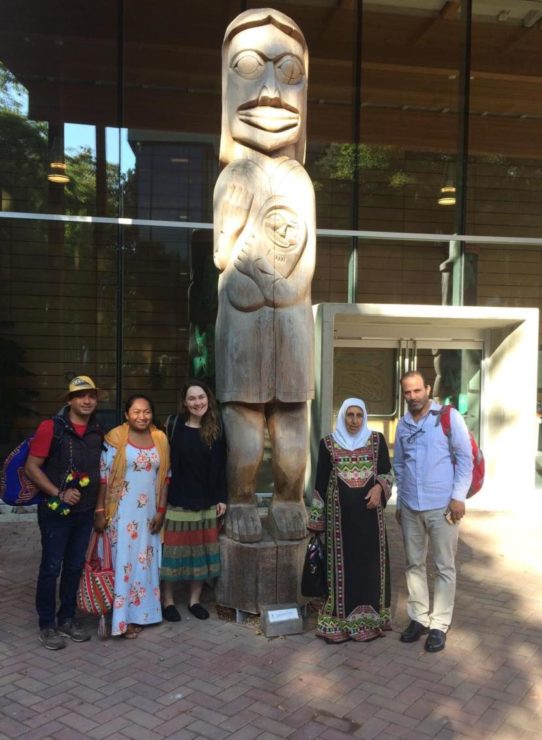“Four Stories About Food Sovereignty” is using community-engaged research to document local efforts to achieve food security

Around the world, numerous individuals live on the edge between food security and insecurity. It is estimated that one in seven people globally are undernourished. Times of global crisis in particular reveal the tenuous nature of our global food system. Access to food is a daily struggle for many people. But food is also something that connects every one of us; it nourishes us culturally just as it is a necessity for survival.
The UVic-based research project “Four Stories About Food Sovereignty: Transnational Crises and Local Action” focuses on food security and aspirations towards food sovereignty in regions around the world, and the actions being taken to reclaim local control over food systems.
Several communites are involved: Southwest Coast and Arctic Indigenous communities in Canada; an Indigenous Wayuu community in La Guajira Peninsula, Colombia; urban Palestinian and Syrian refugee communities in Jordan; and rural and inner-city food producers in South Africa. Through community-engaged research, Four Stories asks how vulnerable communities can sustain themselves in the face of issues such as climate change, water scarcity, political instability, economic inequality, and even global pandemic.
Several of the researchers working on this project are based at the University of Victoria. Research for Four Stories began in April 2019 after receiving funding from the Social Sciences and Humanities Research Council (SSHRC). The project will run for four years and culminate in a feature-length documentary film to share the stories of community efforts around the world to build resilient local food systems. Four Stories builds upon community-engaged research that Elizabeth Vibert began with the women of Hleketani Community Garden in Limpopo Province, South Africa in 2012. The 2017 documentary short film “The Thinking Garden,” directed by UVic gender studies professor and Indigenous filmmaker Christine Welsh, tells the stories of those women.
A professor in the history department at the University of Victoria, and the project director, Vibert draws on the work of international peasant movement La Via Campesina to define food sovereignty as “the right of peoples to healthy and culturally appropriate food produced through ecologically sound and sustainable methods. And crucially, it’s about people’s right to define their own food and agriculture systems.” Specifically, Indigenous food sovereignty also encompasses the reconnection of Indigenous communities with traditional food systems on lands from which those communities have been displaced through environmental dispossession and colonial violence by settler states.
Vibert also emphasizes that food security and food sovereignty exist on a spectrum — the former referring to access to food and the latter “going beyond mere availability of sufficient food to take into account political, ecological, and cultural concerns.” Food security and sovereignty are tied together because both components are required for a food system that is culturally, ecologically, and economically sustainable. Vibert explains that while “small-scale food producers persevere” on a local level in the face of so many factors working against them, “their biggest local challenges are also, often, the problems of communities on the other side of the globe.” The work to secure sustainable access to food on a local level is in fact a transnational endeavour.
Here on Vancouver Island, T’Sou-ke Nation has established a community garden and greenhouse to contribute to their own community’s food needs and support the process of establishing food sovereignty. At the Nation’s Ladybug Greenhouse, T’Sou-ke plant specialist Christine George says that the community garden and greenhouse allow for intergenerational knowledge-sharing. Other learning happens on hikes in the local territory, where, as George says, “we demonstrate how our ancestors gathered food, and we cook like our ancestors did.” Both the knowledge gained and the seeds themselves are passed down on to younger generations. Already the garden has been using seeds saved from an initial offering of George’s own heritage seeds for 12 years.
As Chief Gordon Planes of T’Sou-ke Nation said, “We need to draw a map, a real Canadian map, because our current map is wrong. It should be a territorial map. If people understood the territories they lived in, and the food resources that live within their territories, they would be able to utilize and protect those resources in a sustainable way. So could you help me draw that new map?” It is only through radical change, through drawing this new map, that Indigenous peoples’ sovereignty over their foods and lands can be reclaimed for all future generations.
Now more than ever is the time to help support small-scale food producers around the world to ensure the long-term sustainability of a secure and equitable food system. By working together, a new map that ensures food systems are culturally, ecologically, and economically sustainable can be drawn. While the movement is global, local actions can be taken, just as T’Sou-ke Nation has done, to ensure food security and a measure of food sovereignty for all future generations.







